#App Development Process
Explore tagged Tumblr posts
Text
Mobile App Development Process: From Idea to Launch Mobile App Development Process: From Idea to Launch
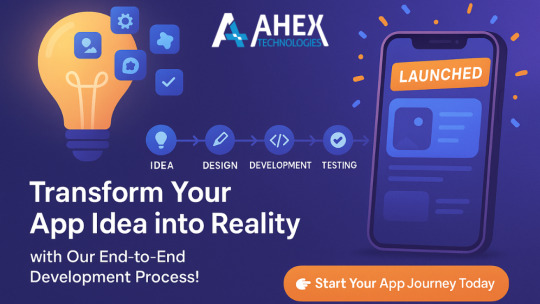
Building a mobile app is an exciting adventure, a chance to transform a brilliant idea into a digital reality. But let’s be honest, if you’re new to the game, the journey can feel a bit daunting. Whether you’re dreaming of an Android app, an iOS app, or a truly custom mobile app development solution, teaming up with the right expert can make all the difference, simplifying the path and bringing your vision to vibrant life.
In this comprehensive guide, we’ll peel back the layers of the mobile app development process. From the spark of an idea to the triumphant launch and beyond, we’ll show you exactly what to expect. You’ll learn how to sidestep common pitfalls and discover why partnering with a top-tier app development agency isn’t just helpful, it’s absolutely essential.
Want to dive deep? check out our more in-depth blog on the mobile app development process
Why Choosing the Right Mobile App Development Company Matters
The mobile app market? It’s booming! Businesses across every industry are diving in, using apps to connect with customers, streamline operations, and unlock exciting new revenue streams. Yet, not every app finds its footing. In fact, many don’t quite hit the mark or simply get lost in the crowded app stores.
So, what’s the secret to a standout app? Often, it’s about partnering with an experienced, reliable app development company that truly gets both the technical wizardry and the business savvy needed to build successful mobile applications.
A trusted mobile app development agency doesn’t just code; they offer:
Platform Expertise: Whether you need specialists in Android app development, iOS app development, or versatile cross-platform development, they’ve got you covered.
Custom Solutions: Forget one-size-fits-all. They provide tailored mobile app development services designed specifically for your unique business needs.
Future-Ready Development: Leveraging the latest tools and mobile app development technologies, they build apps that are scalable, secure, and ready for what’s next.
End-to-End Support: From that initial spark of an idea to crucial post-launch maintenance, they’re with you every step of the way.
Full-Cycle Mobile App Development: This means guiding you from concept validation all the way through to scaling your app for impressive growth.
Choosing the right partner isn’t just about getting an app built; it’s about ensuring your app becomes a valuable, strategic asset that genuinely drives your business forward.
Step 1: Ideation — Defining Your App’s Purpose and Business Goals
Every truly great app begins with a crystal-clear purpose. Before any code is written, it’s vital to:
Identify the Problem: What genuine pain point will your app solve? What need will it meet for your users?
Understand Your Audience: Who are your users? Are they primarily on Android, iOS, or both? What do they expect from a mobile experience?
Set Business Objectives: Is your goal brand awareness, revenue generation, enhanced operational efficiency, or something else entirely?
Outline Key Features: What core functionalities are absolutely essential to make your app competitive and valuable?
Consider Monetization: How will your app generate revenue? Will it be free, freemium, paid, or include in-app purchases or ads?
Envision Custom Mobile App Development Solutions: Dream big! What unique features will truly set your app apart from the crowd?
The best mobile app development companies often kick things off with specialized ideation workshops or discovery sessions. These are invaluable for refining your concept and ensuring it aligns perfectly with market demands.
Step 2: Market Research, Competitor Analysis, and Feasibility Study
Understanding the current market landscape isn’t just important, it’s crucial for success:
Analyze Competitors: Dive deep into apps similar to yours. What are they doing well? Where do they fall short? This is your opportunity to learn and innovate.
Identify Market Gaps: Are there unmet needs or underserved user segments your app can specifically target?
Gather User Insights: Go straight to the source! Conduct surveys or focus groups to validate your brilliant idea with real potential users.
Technical Feasibility: Can your concept actually be developed with current technologies, and importantly, within your budget?
Learn from Top Mobile App Development Companies: Study the success stories. How were leading apps built? What strategies did they employ?
Partnering with an experienced app development agency helps you navigate this critical phase with structured research and actionable insights, setting a strong foundation.
Step 3: How to Choose the Right Mobile App Development Company
Selecting a mobile app development company isn’t just about technical prowess. It’s about finding a team that genuinely understands your business and shares your vision for success.
Here are key factors to consider when making this vital choice:
Proven Track Record: Look for extensive experience in both Android app development and iOS app development across diverse industries.
Custom Mobile App Development Expertise: Avoid agencies that offer generic, “off-the-shelf” solutions. You need a team that crafts unique experiences.
Full-Cycle Capabilities: Ensure they offer end-to-end services, from initial strategy and stunning design to robust development, rigorous testing, and ongoing maintenance.
Agile Methodology: This indicates flexibility and adaptability, allowing your project to evolve smoothly as requirements shift.
Strong Communication: Expect regular updates, complete transparency, and a truly collaborative approach.
Portfolio of Successful App Development Projects: Always ask for real-world examples that demonstrate their results and capabilities.
Don’t hesitate to request case studies, client references, and live examples of the apps they’ve built. Your future app deserves nothing less!
Step 4: Step-by-Step Mobile App Development Process for Businesses
A visually appealing and truly user-friendly interface is absolutely critical for app success. Exceptional design significantly boosts user retention, engagement, and even your app’s ratings in the app stores.
The design phase typically includes:
Wireframing: This is the blueprint, the structural layout of your app and its user flow.
Interactive Prototypes: Early-stage, clickable models that allow for vital feedback and validation before extensive development.
UI/UX Design: Crafting visually stunning, intuitive interfaces specifically optimized for both Android and iOS platforms.
Brand Integration: Ensuring a consistent visual identity that perfectly aligns with your business and brand guidelines.
Accessibility: Designing for inclusivity, ensuring your app is usable and enjoyable for diverse user needs.
The best mobile app development companies invest significant time and expertise in this design stage, ensuring your app doesn’t just look great but functions flawlessly.
Step 5: Technical Planning and Scalable Technology Stack Selection
Behind every successful app lies a robust technical foundation. Your trusted app development agency will guide you in selecting the ideal technology stack based on crucial factors like:
Native vs. Cross-Platform Development: Native apps often deliver optimal performance, while cross-platform solutions (like Flutter or React Native) can offer benefits in terms of time and budget.
Backend Infrastructure: This covers essential components like servers, databases, APIs, and leveraging powerful cloud services.
Third-Party Integrations: Seamlessly connecting with payment gateways, social logins, mapping services, and more.
Security Measures: Implementing vital data encryption, secure authentication protocols, and ensuring compliance with all relevant privacy regulations.
Scalability: Building your app with the future firmly in mind, ready to effortlessly support significant user growth and increased demand.
This pivotal step ensures your app is not only scalable and secure but also engineered to perform exceptionally under real-world conditions.
Step 6: Full-Cycle Mobile App Development — From Code to Product
This is where the magic happens, development truly brings your app to life! Your chosen app development company will meticulously handle:
Frontend Development: Meticulously building the app’s user interface for both Android and iOS.
Backend Development: Creating the powerful server-side functionality and essential integrations that make your app work.
Custom Features: Implementing tailored mobile app development solutions to precisely meet your unique, specific requirements.
Continuous Testing: Proactively identifying and resolving issues early in the development cycle.
Ongoing Collaboration: Ensuring your valuable feedback is integrated at every single stage of the process.
Agile development methodologies allow for iterative releases, giving you continuous visibility and control throughout the entire development journey.
Step 7: Comprehensive Testing and Quality Assurance (QA)
Rigorous testing isn’t just a step; it’s a commitment to ensuring your app is reliable, secure, and truly user-friendly:
Functional Testing: Verifying that all features and workflows operate exactly as intended.
Performance Testing: Ensuring optimal speed, stability, and scalability even under heavy load.
Compatibility Testing: Checking flawless operation across a wide range of devices, screen sizes, and operating systems.
Security Testing: Proactively identifying vulnerabilities and implementing robust measures to protect user data.
User Acceptance Testing (UAT): Gathering invaluable real-world feedback from actual users to fine-tune and perfect the app.
A trusted mobile app development agency places immense importance on QA, guaranteeing a polished, high-performing product before it reaches your users.
Step 8: Launch Preparation and App Store Optimization for Maximum Visibility
Launching your app is a major milestone, and it involves strategic preparation:
App Store Optimization (ASO): Crafting compelling titles, engaging descriptions, relevant keywords, and attractive visuals to boost discoverability.
Compliance Checks: Meticulously meeting all the requirements for both the Google Play Store and Apple App Store.
Beta Testing: Conducting final rounds of testing with a select group of users to gather last-minute feedback and fine-tune before the full release.
Marketing Support: Implementing pre-launch promotion strategies, press releases, and targeted outreach to generate buzz.
Go-Live: The exciting moment of publishing your app and diligently monitoring its initial performance.
Partnering with a trusted app development agency ensures a smooth, successful launch, maximizing your app’s visibility and initial downloads.
Step 9: Post-Launch Support, Maintenance, and Continuous Improvement
The journey doesn’t end at launch! Continuous support is key to keeping your app competitive and thriving:
Bug Fixes: Promptly resolving any technical issues that may arise.
Performance Optimization: Constantly improving speed, stability, and responsiveness to enhance user experience.
Feature Enhancements: Adding exciting new functionality based on evolving user needs and market trends.
OS Compatibility: Regularly updating your app to ensure seamless operation with the latest Android and iOS versions.
Analytics and Insights: Monitoring user behavior and data to inform future improvements and strategic decisions.
Custom Mobile App Development Services for Long-Term Growth: Ensuring your app evolves proactively with your business’s changing demands.
The best app development agencies offer long-term partnerships, vital for sustained success in the dynamic mobile landscape.
Step 10: Scaling Your Mobile App with Custom Solutions for Business Growth
As your user base expands, scalability becomes absolutely crucial for sustained success:
Backend Optimization: Ensuring your infrastructure can gracefully handle increased traffic and data.
Cloud Integration: Leveraging flexible and powerful cloud services for robust scalability and cost efficiency.
Localization: Adapting your app for new markets and languages, opening up global opportunities.
Cross-Platform Expansion: If you started with one platform, strategically build for both Android and iOS App development to reach a wider audience.
Monetization Optimization: Continuously refining your revenue models for maximum return on investment (ROI).
An expert, future-ready mobile app development company ensures your app grows and evolves perfectly alongside your business.
Conclusion: Empower Your Business with Expert, Custom Mobile App Development Solutions
The mobile app development process can seem intricate, but with the right partner by your side, it transforms into an exciting and incredibly rewarding journey. From that initial spark of an idea through to triumphant launch and ongoing support, an experienced app development agency brings unparalleled expertise, structured methodology, and true innovation to your project.
Whether you’re actively searching for a specialized Android app development company, dedicated iOS specialists, or comprehensive full-cycle custom mobile app development services, selecting the perfect team is paramount to turning your innovative idea into a high-performing, scalable app.
Your app deserves more than just generic solutions; it deserves thoughtful design, expert development, and dedicated ongoing support tailored precisely to your needs.
Ready to build an app that truly drives real results for your business?
Partner with a trusted mobile app development company like us and let’s create something extraordinary together.
Extended FAQs: Your Mobile App Development Process Questions Answered
Still curious? We’ve got answers!
What are the steps to develop a mobile app? It involves idea/requirements, UI/UX design, development, testing, launch, and ongoing maintenance. Partnering with experts ensures success.
What are the 7 stages of app development? Idea, market research, UI/UX design, development, testing, deployment, and maintenance. Each stage ensures a user-friendly, functional app.
What are the 5 phases of the app development process? Planning, design, development, testing, and deployment. This structured process ensures a well-planned, user-friendly, and technically sound app.
How long does it take to develop a mobile app? Simple apps might take 3–4 months; complex custom mobile app development projects can span 6–12+ months.
Is cross-platform development a good choice? It can reduce costs/timelines but may sacrifice some native performance. Your app development company will recommend the best approach.
Is mobile app developer easy? No, it requires technical skills, experience, and planning. But with the right team, it becomes manageable.
What’s the difference between an Android app development company and an iOS app development company? Some specialize in one platform, others offer both. A full-service app development agency ensures consistency across platforms.
How much does mobile app development cost? Costs vary greatly based on complexity, platforms, and features. Basic apps start around $10,000; complex custom mobile app development services can exceed $100,000.
Why choose custom mobile app development over off-the-shelf solutions? Custom apps provide unmatched scalability, security, and unique features tailored for your competitive advantage.
What happens after my app is launched? Post-launch support includes maintenance, bug fixes, OS updates, performance monitoring, and future feature development.
What are the benefits of working with a full-cycle mobile app development company? You get end-to-end services, from idea to scaling, ensuring consistency, quality, and long-term success.
Ready to start your app journey?
Explore our complete mobile app development process or
connect with our experts today!
0 notes
Text
#Build A Marketplace App Like Mercari#Marketplace App#Mobile App Development#Mobile marketplace apps#hire Flutter mobile app developers#hired a top-level flutter developer agency#Custom Marketplace App#app development process#cross-platform app performance#User-friendly UI/UX#Mobile App Maintenance
0 notes
Text
App development process
App development process: by Skyweb design technologies
What is app:
An app, short for "application," is a software program designed to perform specific tasks or functions for the user. Apps can run on various platforms, including computers, mobile devices, and web browsers. They can be broadly categorized into different types based on their platform and purpose.
Types of Apps ;
1. Mobile Apps
Native Apps: Developed specifically for a particular platform (e.g., iOS or Android) using the platform's native programming languages and tools. They offer the best performance and integration with the device's features.
Hybrid Apps: Built using web technologies (HTML, CSS, JavaScript) and wrapped in a native container. They can run on multiple platforms with a single codebase.
Web Apps: Accessible via web browsers and are typically responsive, meaning they work well on both desktops and mobile devices.
Desktop Apps
Native Desktop Apps: Designed to run on specific operating systems like Windows, macOS, or Linux. They often provide richer functionality and better performance.
Web-based Desktop Apps: Run in web browsers and can be accessed from any device with an internet connection. Examples include Google Docs and Microsoft Office Online.
Web Apps
Static Web Apps: Simple web pages that deliver the same content to every user. They don't interact with databases and are often used for informational purposes.
Dynamic Web Apps: Interact with databases and servers to deliver personalized content. Examples include e-commerce sites, social networks, and online banking services.
Process of app development :
The process of app development involves several stages, each critical to creating a successful and functional application. Here's a detailed overview of the typical steps involved in app development:
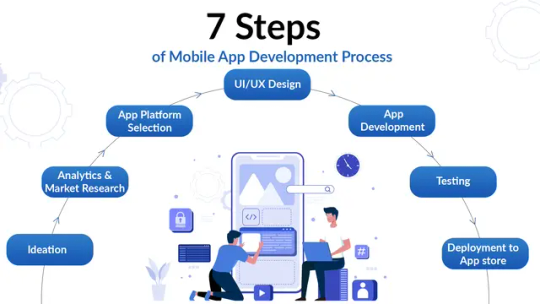
1. Idea and Conceptualization
Define the Idea: Identify the problem your app will solve and the value it will provide to users.
Market Research: Analyze the market to understand the demand, study competitors, and identify your target audience.
2. Planning
Requirements Gathering: List the features and functionalities your app will have.
Technical Feasibility: Evaluate the technical aspects and feasibility of the project.
Project Roadmap: Create a timeline, set milestones, and allocate resources.
3. Design
Wireframing: Develop a basic blueprint of the app's layout and structure.
UI/UX Design: Design the user interface (UI) and user experience (UX) to ensure the app is visually appealing and user-friendly.
Prototype: Build a prototype to visualize the app's flow and gather initial feedback.
4. Development
Choosing a Platform: Decide if the app will be native (specific to a platform like iOS or Android), hybrid, or web-based.
Backend Development: Set up the server, database, and APIs to manage data and server-side logic.
Frontend Development: Implement the user interface and integrate it with the backend services.
Iterative Development: Use agile methodology to develop the app in iterative cycles, incorporating continuous feedback and improvements.
5. Testing
Quality Assurance (QA): Conduct various tests to identify and fix bugs, ensuring the app functions correctly.
Unit Testing: Test individual components for correct functionality.
Integration Testing: Ensure that different parts of the app work together smoothly.
System Testing: Test the entire app to ensure it meets the specified requirements.
User Acceptance Testing (UAT): Validate the app with real users to ensure it meets their needs.
Usability Testing: Ensure the app is easy to use and navigate.
Performance Testing: Check the app's performance under various conditions.
6. Deployment
App Store Submission: Prepare the app for submission to app stores (Google Play, Apple App Store), ensuring compliance with their guidelines.
Server Deployment: Deploy the backend server and ensure it is scalable and secure.
Monitoring: Monitor the app for issues, crashes, and performance after launch.
7. Post-Launch
Gather User Feedback: Collect feedback from users to understand their experience and identify areas for improvement.
Bug Fixes and Updates: Regularly update the app to fix bugs, enhance performance, and add new features.
Marketing and Promotion: Promote the app to increase visibility and attract users.
8. Maintenance
Ongoing Support: Provide continuous support and maintenance to ensure the app remains functional and relevant.
Performance Monitoring: Regularly monitor app performance and make necessary optimizations.
Scaling: Scale the app infrastructure as the user base grows.
Example: SkyWeb Design Technologies Process
SkyWeb Design Technologies, as a top web development company in Hyderabad, follows a streamlined app development process similar to the one outlined above. They emphasize thorough planning, user-centric design, and rigorous testing to deliver high-quality apps tailored to clients' needs.
By following these steps, developers can create a robust, user-friendly, and successful application that meets the needs of its target audience. If you need more details on any specific stage of the app development process.
IMPORTANCE OF APP
Apps play a crucial role in our daily lives, enabling us to perform various tasks efficiently, stay connected with others, access entertainment, and manage our work and personal activities. They are essential tools for businesses to reach their customers, streamline operations, and provide services.
Enhance Accessibility and Convenience: Offer instant access to services and simplify tasks.
Personalize User Experience: Deliver tailored content and intuitive interfaces.
Boost Business Growth: Engage customers and create revenue opportunities.
Improve Productivity: Streamline tasks and automate processes.
Drive Innovation: Incorporate cutting-edge technologies and integrate with other platforms.
Facilitate Communication: Enable global connectivity and social interaction.
Support Health and Well-being: Track health metrics and offer mental health resources.
Advance Education: Provide accessible learning and skill development tools.
Offer Entertainment: Deliver diverse and interactive content for leisure.
Key Features of Apps
User Interface (UI): The visual part of the app that users interact with.
User Experience (UX): The overall experience of using the app, focusing on ease of use and satisfaction.
Functionality: The specific tasks and operations the app can perform.
Performance: How efficiently the app runs, including speed, responsiveness, and resource usage.
Security: Measures taken to protect user data and ensure privacy.
Compatibility: The ability of the app to run on different devices and operating systems.
Examples of Popular Apps
Social Media: Facebook, Instagram, Twitter
Messaging: WhatsApp, Telegram, Slack
Productivity: Microsoft Office, Google Workspace, Evernote
Entertainment: Netflix, Spotify, YouTube
E-commerce: Amazon, eBay, Shopify
Conclusion :
The app development process is a comprehensive and multi-faceted journey that involves several key features to ensure the creation of a successful application. From the initial idea and planning stages through to design, development, testing, and deployment, each step is crucial. Emphasizing user-centric design, robust architecture, agile methodologies, rigorous testing, and continuous improvement ensures that the app not only meets the functional requirements but also provides an exceptional user experience.
SkyWeb Design Technologies exemplifies this approach, focusing on delivering high-quality, tailored solutions that address client needs and market demands. By adhering to best practices and leveraging the latest technologies, developers can create apps that are scalable, secure, and user-friendly, ultimately leading to greater user satisfaction and business success.
For more information to visit our website: Skyweb design technologies
Contact number: +91 79817 28810
Adress: 15th floor, Manjeera trinity corporation, kukatpally, HYDERABAD.
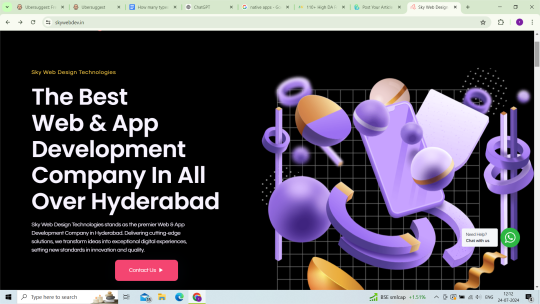
#app development#app development process#app development company in hyderabd#app process#best app developers in hyderabad#skyweb design technologies
0 notes
Text
Experiment #2.3: 30-Day Google Gemini AI App Challenge: Building a Goal-Crushing Machine (5 Days Behind, But Full Speed Ahead!)
Hello everyone! It’s Day 5 of my ambitious 30-day challenge to build two apps with Google’s Gemini AI. I’ve hit a few snags that pushed back the start, but I’m more determined than ever to make this a success. Focus Shift: Your Public Roadmap to AI-Powered Goal Setting For this blog post, I’ll be focusing on the app we’re building together in public: a tool to help you smash your long-term…
0 notes
Text
#App Development Process#eCommerce Mobile App#E-commerce App Development#E-commerce Store App Development#eCommerce Mobile App Development
0 notes
Text
Decoding App Development Costs in India: What to Expect
Embarking on the journey of app development is an exciting venture, but one that often comes with questions about costs. In India, where the tech industry is thriving, understanding how much an app developer charges is crucial for planning and budgeting. In this guide, we’ll delve into the factors influencing app development costs and provide insights into what you can expect when hiring an app…
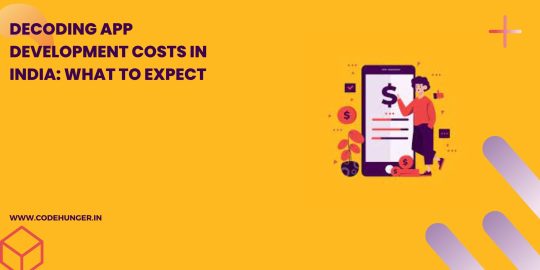
View On WordPress
#Android app development#App Design Costs#App Developer Charges#App Development Agencies#App Development Budget#App Development Costs#App Development Process#App Maintenance Costs#Complex App Development#Cross-Platform App Development#Custom App Development#Digital Innovation Costs#Freelance App Developers#Indian App Developers#Indian Tech Industry#iOS App Development#Mobile App Cost Estimation#Mobile App Investment#Mobile App Market in India#Mobile App Pricing
0 notes
Text
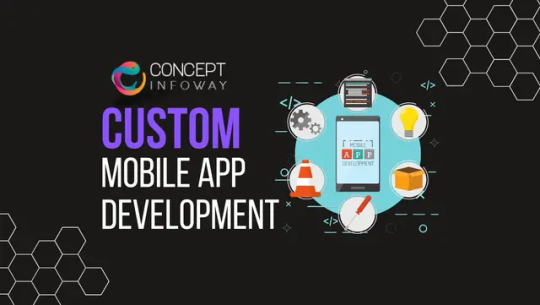
In today’s digital era, mobile apps have become a crucial component of businesses across various industries. Custom mobile app development offers numerous advantages, allowing companies to tailor their applications to specific needs and goals. When it comes to creating innovative and impactful mobile apps, Concept Infoway stands out as a leading development company that brings expertise, experience, and a commitment to excellence.
0 notes
Text

Auspicious Soft follows a rigorous app development process that ensures that our apps are high-quality and user-friendly. Our process includes ideation, planning, development, testing, deployment, and marketing. We use the latest technologies to develop your app, and we test it thoroughly to ensure that it is bug-free. We also help you market your app to your target audience. Contact us today to learn more about how we can help you create a successful app.
#app development process#app development techniques#native development#cross-platform development#hybrid development#auspicious soft#high quality apps#user-friendly apps#latest technologies#bug-free apps#marketing apps
1 note
·
View note
Text

So, dear Tumblr users!
Please give this post some attention! My development team and I are making a game in the yandere horror genre. My videos don't fly on Tik Tok, and things aren't any better on Tumblr. There are only 10 subscribers in my Telegram channel. We are very worried and don’t understand what we are doing wrong. Please, if you are interested in this post, like it and go to my tg channel or TikTok
I will leave links to my social networks below: TikTok: __h.e.i.w.a_ Telegram: https://t.me/visual_novel_YAM
#art#artwork#artists on tumblr#my art#digital art#illustration#drawing#character design#art process#ot#original character#oc art#oc#otome game#otome#otaku#game character#gaming#game#gamedev#game making#pc games#game development#mobile app development#painting#ibispaint art#ibispaintdrawing#made in ibis paint#ibispaintx
14 notes
·
View notes
Text
youtube
Is your website accessible? (Beginners Guide)
Making your website as accessible as possible is not just a legal or ethical requirement, it’s also a practical concern—allowing everyone to benefit from your content. Here are four areas to review.
#beginners guide#ui ux design#ui design#youtube#ux and ui design#web design#education#free education#How to Design Accessible UX#web accessibility#ui design inspiration#ux design process#ux research#ux designer#ux ui design#breaking barriers#accessibility#accessibleliving#accessible design#accessibility for all#website accessible#app developers#Youtube
4 notes
·
View notes
Text
The App Evolution: A Creative Guide to Building Mobile App Solutions
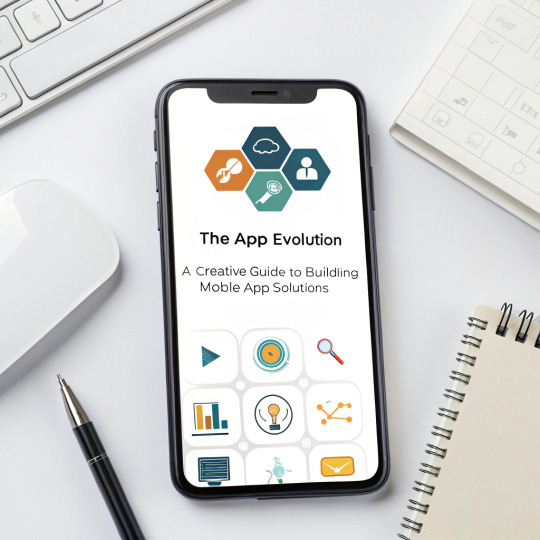
In digital world, mobile apps have become essential tools for businesses and consumers alike. Whether it's for shopping, communication, or managing daily tasks, mobile apps simplify life and drive engagement. This guide explores the evolution of app development and offers a step-by-step overview of the mobile app development process—perfect for entrepreneurs and businesses looking to create impactful mobile solutions.
Understanding Mobile App Development
Mobile app development involves designing, developing, testing, and deploying apps specifically for mobile and tablets. With billions of mobile phones users global market, businesses now consider apps as key touchpoints for engaging customers, delivering services, and driving revenue.
Here are many types of mobile apps, including:
Native Apps Native apps are built specifically for a single operating system—either iOS or Android��using platform-specific programming languages like Swift for iOS or Kotlin for Android. They offer the best performance, seamless integration with device features (camera, GPS, etc.), and a smooth user experience. However, developing native apps for multiple platforms requires separate codebases, which can increase cost and development time.
Hybrid Apps Hybrid apps combine features of native and web app into a single solution. They are developed using web technologies like HTML, CSS, and JavaScript, then wrapped in a native container. This allows the app to run across multiple platforms from a single codebase. While hybrid apps are cost-effective and quicker to develop, they may not perform as smoothly as native apps, especially for complex features.
Web Apps Web apps are responsive websites designed for mobile devices, offering an app-like experience while operating entirely within a web browser.. They are responsive, easy to update, and accessible without requiring installation from app stores. Though they’re great for lightweight applications, they have limited access to device features and typically offer lower performance compared to native and hybrid apps.
Choosing the right type depends on your goals, budget, and the user experience you want to deliver.
The Creative Journey: Mobile App Development Process
The mobile app development process involves many stages, each requiring collaboration between developers, designers, and stakeholders. Here's a breakdown of each step:
Idea and Research Every app begins with a problem to address. Define its core purpose, identify your target audience, and highlight what makes it different from existing solutions. Conduct thorough market research to validate your concept and analyze the competition.
Strategy and Planning Set goals for your app and decide on key features. Choose between platforms (iOS, Android, or both), and define the technical needs . During this phase, you’ll also decide whether to build your app in-house or hire a professional app development company.
Design and Prototyping UI/UX designers develop wireframes and prototypes to map out the app’s appearance and functionality. A well-crafted, user-friendly interface ensures a seamless experience and boosts user engagement.
App Development This is the crucial part of the mobile app development cycle. Developers write the code, integrate APIs, and build the app’s front-end and back-end functionalities. Whether using native or cross-platform technologies, clean and scalable code is essential.
Testing and Quality Assurance Before launching, your app must undergo thorough testing. QA specialists check for bugs, performance issues, security vulnerabilities, and overall usability. This ensures a smooth experience for your end-users.
Launch and Deployment Once tested and approved, the app is submitted to the Apple App Store and/or Google Play Store. Each platform has guidelines and approval processes. A well-executed launch includes marketing, user onboarding, and collecting feedback.
Maintenance and Updates App development doesn’t stop at launch. Regular updates, bug fixes, and feature enhancements are crucial to keep your app relevant and competitive in the market.
Why the Mobile App Development Process Matters
Skipping steps or rushing through the mobile app development process can lead to poor performance, low user engagement, or app failure. In the app development process every part have crucial role in building flexible, secure, and user-friendly product . Businesses that follow a well-structured process benefit from faster time to market, reduced costs, and higher customer satisfaction.
Tips for a Successful App Development Journey
Focus on client requirement – Design with the end user in mind to assure value and usability.
Keep it simple – Start with an MVP (Minimum Viable Product) to test and iterate.
Invest in quality – Hire experienced developers or an agency specializing in mobile app development.
Prioritize performance – Speed, security, and reliability are non-negotiable.
Stay updated – Trends change rapidly; keep up with the latest technologies and user preferences.
Final Thoughts
The increasing demand of mobile app development is transforming digital market and revolutionizing how users connect with technology. By understanding the full scope of the mobile app development process, businesses can create smarter, more impactful digital products. Whether you’re building your first app or scaling an existing one, strategic planning and creativity are the keys to success.
#Mobile app development process#app development process#app development cycle#mobile app development cycle#mobile app development#app development#top app development#best app development
1 note
·
View note
Text
How Much Does It Cost To Build A Marketplace App Like Mercari?
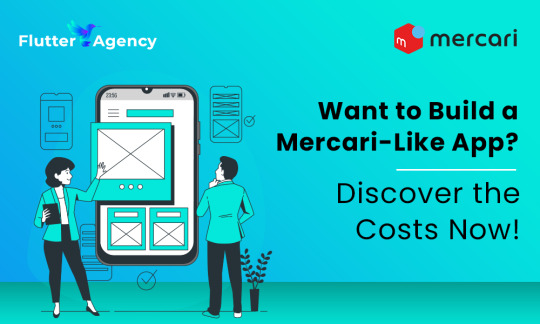
Mobile marketplace apps are the newest ideas that drive both innovation and the business factor for different industries. The best part about such apps is that you can be both a customer and a merchant, depending on your needs at the moment.
Mercari is one such C2C app that allows you to buy and sell using their platform, gaining a unique experience. And since the huge success around the same, many different types of marketplace apps have also come up.
Currently, building marketplace apps like Mercari is all the rage for tech and business enthusiasts. And those who want to break into this industry sooner, are choosing to build marketplace apps with the Flutter framework.
It cannot be denied that the Flutter framework results in the best UI interface and performant apps across niches; so, if you are looking to enter this particular arena, you might wish to hire Flutter mobile application developers who are nuanced at their game. As for building your own marketplace app, read ahead to understand more.
Building A Marketplace App: Dissecting The Costs
The first step towards building a marketplace app is to study the benchmark you’ve taken up as inspiration. For this, you would need to completely understand all aspects of the business model that a marketplace app like Mercari has. This will help set the standards for your own marketplace and give you directions of where to start and what steps to take up, initially.
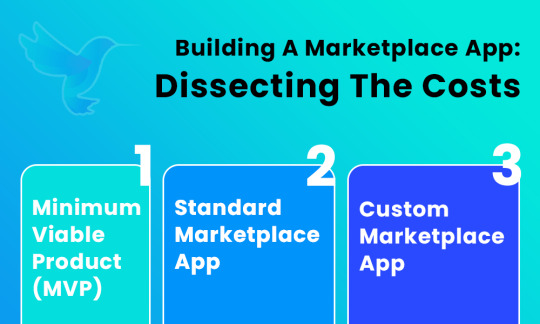
The costs of building a marketplace app depend on various factors, but we can broadly break it down in this way, based on the complexity of the app you’re building to launch:
1. Minimum Viable Product (MVP):
If you’re only looking to enter the market as of now, by building a simple app with most of the core functionalities like listings, chat, payment processing, etc. The costs can range around $15,000 – $25,000. This also depends on if you have freelancers to help you with this project or have hired a top-level flutter developer agency.
2. Standard Marketplace App:
A standard marketplace app is more feature-rich as compared to MVP. It is inclusive of features like a search button, push notifications, and social media sharing as well. Building a standard marketplace app can cost you up to $100,000.
3. Custom Marketplace App:
A custom marketplace caters to a certain section of the target audience, and perhaps you may also be able to charge said audience for the custom features. AI-powered recommendations can be a part of a custom marketplace app. Such an app can cost you anywhere from $150,000 and above.
Marketplace App Building: The Factors Involved
The app development process is similar to any other app development process so that part isn’t what might throw you off. The part that may be a little tricky but will form the base for building your app.
The first part is always finalizing the intent and purpose of your app- without one, it is easy to get lost somewhere along the way. Determining this will help to ensure that your audience stays with the app.
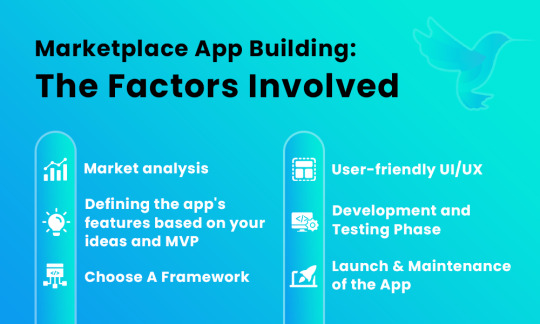
However, these steps require extra clarity and determination on your part, so that your ideas can be brought to life:
Market analysis
The first step is always to start with market analysis and to identify and recognize the target audience. You can also analyze Mercari and other marketplace apps to analyze user feedback to optimize your app to meet user requirements.
One additional thing you can do is to make good note of the pain points of your audience so that you can easily tailor your app to match your audience’s needs.
Defining the app’s features based on your ideas and MVP
Once you are done with your market analysis, you can create an outline where you list out the most essential features in the app.
From here you can go on to create a minimum viable product with a few prioritized features that align with your target audience’s needs.
Choose A Framework
Now, choosing a proper framework is key to building an app that is seamless, and works on multiple platforms. This will help build a dependable and expandable application. Now, Flutter is one of the current best frameworks to build apps, seeing as it allows for cross-platform app performance.
If you are aiming to build a marketplace app with the Flutter framework, it would be best to hire flutter mobile application developers to build your app.
User-friendly UI/UX
The best apps are the ones with the best UI/UX, making it a user-friendly app experience overall. The correct technological stack choice is quite crucial when we are talking about the overall performance and appearance of the app.
In short, the better your UI is, the more chances you have of bringing in more users, as well as retaining the existing ones.
Development and Testing Phase
The most intense as well as important phase while building an app is the development phase. Here, you already have your design at the ready, you get on to developing it entirely.
With the help of the best design techniques, the developers can start producing mock apps and prototypes that be approved to move ahead with the process. Once the prototypes are approved, then the specifications can be further optimized. Soon after this, you can roll your app out for testing, and remove any bugs or usability problems. It is wise to consider both manual and automated testing services for your app.
Launch and Maintenance of the App
The final stage is where all bugs and issues are removed, and you can finally launch the app for public use on the app stores for both Android and iOS. You can also make sure to use SEO-related keywords in the description of the app so that it becomes more visible on the App Store.
For the maintenance part, you can avail mobile maintenance and support services to maintain and update your app for better retention and success according to user metrics.
Conclusion
Building a marketplace app can be quite an exciting endeavor, but it requires careful planning and a realistic understanding of the costs associated with it. By understanding the niche, and your target audience and prioritizing user experience, you can build a strong app that delivers value to your customers.
While cost is just one factor in the grand scheme of things, it is crucial to optimize your approach and plan your app development to reduce the costs altogether. With the correct approach, you can build a marketplace app that resonates with your audience and achieve all your entrepreneurial goals.
#Build A Marketplace App Like Mercari#Marketplace App#Mobile App Development#Mobile marketplace apps#hire Flutter mobile app developers#hired a top-level flutter developer agency#Custom Marketplace App#app development process#cross-platform app performance#User-friendly UI/UX#Mobile App Maintenance
0 notes
Text
People who are impatient with artists for taking a long time to create should push themselves to make something they deem of a similar caliber of what they're expecting. Especially people who aren't creatives.
#Not of the same quality just the same caliber.#excited about a movie that's taking a while? make one. open up your notes app and download iMovie.#impatient about a game that's been in development for years? make one yourself. go on a site that teaches coding for free and get crackin.#restless because the novel you're anticipating's release date got pushed back? crack open a notebook and start writing one.#singer you like been slowly working on an album for literal years? Go open garageband and make some songs for your own.#and I genuinely mean it. Like people should familiarize themselves with the process of making art.#hobbyist art already has its hurdles in creation and if you can realize and appreciate that then you'll have#more compassion for professionals who are held to an industry standard with deadlines and expectations of profit.#jovi talks
2 notes
·
View notes
Text
Experiment #2.2 Doubling Down: Two Google Gemini AI Apps in 30 Days – My Journey
Hello everyone! 👋 Yesterday, I shared my pivot from my initial app idea due to a saturated market. This led me to explore new horizons with the Google Gemini API. Today, I’m thrilled to announce an even bolder challenge: developing two apps in the next 30 days! Two Apps, Two Purposes Public Project: Your Guide to AI App Development. My original concept, a goal-setting app, will continue…
#30-Day Challenge#AI App Development#AI-Powered Apps#App Development Challenge#App Development Process#Behind the Scenes#Building in Public#Goal-Setting Apps#Google AI Tools#Google Gemini API#Indie Developer#Patreon Exclusive#Solo Developer#Startup Journey#Tech Entrepreneur
1 note
·
View note
Text
Non-fiction books that explore AI's impact on society - AI News
New Post has been published on https://thedigitalinsider.com/non-fiction-books-that-explore-ais-impact-on-society-ai-news/
Non-fiction books that explore AI's impact on society - AI News
.pp-multiple-authors-boxes-wrapper display:none; img width:100%;
Artificial Intelligence (AI) is code or technologies that perform complex calculations, an area that encompasses simulations, data processing and analytics.
AI has increasingly grown in importance, becoming a game changer in many industries, including healthcare, education and finance. The use of AI has been proven to double levels of effectiveness, efficiency and accuracy in many processes, and reduced cost in different market sectors.
AI’s impact is being felt across the globe, so, it is important we understand the effects of AI on society and our daily lives.
Better understanding of AI and all that it does and can mean can be gained from well-researched AI books.
Books on AI provide insights into the use and applications of AI. They describe the advancement of AI since its inception and how it has shaped society so far. In this article, we will be examining recommended best books on AI that focus on the societal implications.
For those who don’t have time to read entire books, book summary apps like Headway will be of help.
Book 1: “Superintelligence: Paths, Dangers, Strategies” by Nick Bostrom
Nick Bostrom is a Swedish philosopher with a background in computational neuroscience, logic and AI safety.
In his book, Superintelligence, he talks about how AI can surpass our current definitions of intelligence and the possibilities that might ensue.
Bostrom also talks about the possible risks to humanity if superintelligence is not managed properly, stating AI can easily become a threat to the entire human race if we exercise no control over the technology.
Bostrom offers strategies that might curb existential risks, talks about how Al can be aligned with human values to reduce those risks and suggests teaching AI human values.
Superintelligence is recommended for anyone who is interested in knowing and understanding the implications of AI on humanity’s future.
Book 2: “AI Superpowers: China, Silicon Valley, and the New World Order” by Kai-Fu Lee
AI expert Kai-Fu Lee’s book, AI Superpowers: China, Silicon Valley, and the New World Order, examines the AI revolution and its impact so far, focusing on China and the USA.
He concentrates on the competition between these two countries in AI and the various contributions to the advancement of the technology made by each. He highlights China’s advantage, thanks in part to its larger population.
China’s significant investment so far in AI is discussed, and its chances of becoming a global leader in AI. Lee believes that cooperation between the countries will help shape the future of global power dynamics and therefore the economic development of the world.
In thes book, Lee states AI has the ability to transform economies by creating new job opportunities with massive impact on all sectors.
If you are interested in knowing the geo-political and economic impacts of AI, this is one of the best books out there.
Book 3: “Life 3.0: Being Human in the Age of Artificial Intelligence” by Max Tegmark
Max Tegmark’s Life 3.0 explores the concept of humans living in a world that is heavily influenced by AI. In the book, he talks about the concept of Life 3.0, a future where human existence and society will be shaped by AI. It focuses on many aspects of humanity including identity and creativity.
Tegmark envisions a time where AI has the ability to reshape human existence. He also emphasises the need to follow ethical principles to ensure the safety and preservation of human life.
Life 3.0 is a thought-provoking book that challenges readers to think deeply about the choices humanity may face as we progress into the AI era.
It’s one of the best books to read if you are interested in the ethical and philosophical discussions surrounding AI.
Book 4: “The Fourth Industrial Revolution” by Klaus Schwab
Klaus Martin Schwab is a German economist, mechanical engineer and founder of the World Economic Forum (WEF). He argues that machines are becoming smarter with every advance in technology and supports his arguments with evidence from previous revolutions in thinking and industry.
He explains that the current age – the fourth industrial revolution – is building on the third: with far-reaching consequences.
He states use of AI in technological advancement is crucial and that cybernetics can be used by AIs to change and shape the technological advances coming down the line towards us all.
This book is perfect if you are interested in AI-driven advancements in the fields of digital and technological growth. With this book, the role AI will play in the next phases of technological advancement will be better understood.
Book 5: “Weapons of Math Destruction: How Big Data Increases Inequality and Threatens Democracy” by Cathy O’Neil
Cathy O’Neil’s book emphasises the harm that defective mathematical algorithms cause in judging human behaviour and character. The continual use of maths algorithms promotes harmful results and creates inequality.
An example given in the book is of research that proved bias in voting choices caused by results from different search engines.
Similar examination is given to research that focused Facebook, where, by making newsfeeds appear on users’ timelines, political preferences could be affected.
This book is best suited for readers who want to adventure in the darker sides of AI that wouldn’t regularly be seen in mainstream news outlets.
Book 6: “The Age of Em: Work, Love, and Life when Robots Rule the Earth” by Robin Hanson
An associate professor of economics at George Mason University and a former researcher at the Future of Humanity Institute of Oxford University, Robin Hanson paints an imaginative picture of emulated human brains designed for robots. What if humans copied or “emulated” their brains and emotions and gave them to robots?
He argues that humans who become “Ems” (emulations) will become more dominant in the future workplace because of their higher productivity.
An intriguing book for fans of technology and those who love intelligent predictions of possible futures.
Book 7: “Architects of Intelligence: The truth about AI from the people building it” by Martin Ford
This book was drawn from interviews with AI experts and examines the struggles and possibilities of AI-driven industry.
If you want insights from people actively shaping the world, this book is right for you!
CONCLUSION
These books all have their unique perspectives but all point to one thing – the advantages of AI of today will have significant societal and technological impact. These books will give the reader glimpses into possible futures, with the effects of AI becoming more apparent over time.
For better insight into all aspects of AI, these books are the boosts you need to expand your knowledge. AI is advancing quickly, and these authors are some of the most respected in the field. Learn from the best with these choice reads.
#2024#ai#ai news#ai safety#Algorithms#Analytics#applications#apps#Article#artificial#Artificial Intelligence#author#background#Bias#Big Data#book#Books#brains#Building#change#China#code#competition#creativity#data#data processing#Democracy#development#double#dynamics
2 notes
·
View notes
Text
trying this new thing where I try to be nice to myself for not writing whenever I want to or whenever I usually expect myself to write :)
#ACTUALLY HELPFUL???#cuz like sometimes I DO want to write but I just don’t do it either cuz I don’t feel like emotionally ready#(which happens a lot lol I am SENSITIVE)#or like sometimes I just have an expectation I won’t go XYZ days without drafting#now I love me some consistency but also it’s ok lol#having fun in other ways !!! BY THAT I MEAN NETFLIX EDITS#I ALSOOO wanna use this encourage myself to brainstorm more LOL#cuz to be fair I only ever really engage in my writing when I’m actually drafting#which is kind of a newer development (last 3 years) in my process that I don’t like#like girl can you think OUTSIDE of drafting hours???? like let’s get silly in the notes app!!!!
13 notes
·
View notes